|
|
|
Sort Order |
|
|
|
Items / Page
|
|
|
|
|
|
|
| Srl | Item |
| 1 |
ID:
133030
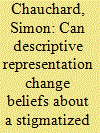

|
|
|
|
|
| Publication |
2014.
|
| Summary/Abstract |
Can descriptive representation for a stigmatized group change the beliefs and intentions of members of dominant groups? To address this question, I focus on quotas (reservations) that allow members of the scheduled castes to access key executive positions in India's village institutions. To measure the psychological effect of reservations, I combine a natural experiment with an innovative MP3-player-based self-administered survey that measures various beliefs and behavioral intentions. Results provide credible causal evidence that reservations affect the psychology of members of dominant castes. Even though villagers living in reserved villages continue to think poorly of members of the scheduled castes (stereotypes do not improve), reservation affects two other types of beliefs: perceived social norms of interactions and perceived legal norms of interactions. These changes in beliefs in turn appear to have far-reaching consequences for intercaste relations, as villagers' discriminatory intentions also decrease under reservation.
|
|
|
|
|
|
|
|
|
|
|
|
|
|
|
|
| 2 |
ID:
148000
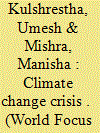

|
|
|
|
|
| Summary/Abstract |
It is high time to put our sincere efforts to implement a holistic program to develop new materials for cleaner energy for its cost effectiveness to make affordable to poor people in rural India. There is an immediate need to shift towards solar and wind energy options. As our country is known for agriculture, production of biomass and agricultural waste is unavoidable for which biorefinery is the need of the hour. These options of energy not only help developing rural India but will give rise to healthier and happier lives in the villages which will further help in increased GDP of the country.
|
|
|
|
|
|
|
|
|
|
|
|
|
|
|
|
| 3 |
ID:
001033
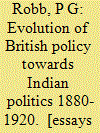

|
|
|
|
|
| Publication |
New Delhi, Manohar pub., 1992.
|
| Description |
x, 400p.hbk
|
| Standard Number |
817304001X
|
|
|
|
|
|
|
|
|
|
|
|
Copies: C:1/I:0,R:0,Q:0
Circulation
| Accession# | Call# | Current Location | Status | Policy | Location |
| 040528 | 954.03/ROB 040528 | Main | On Shelf | General | |
|
|
|
|
| 4 |
ID:
165089
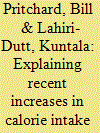

|
|
|
|
|
| Summary/Abstract |
During the past decade, considerable research efforts have sought to explain India’s “calorie consumption paradox”, namely, the coexistence of a decline in average per capita calorie intake in rural India alongside increased material living standards. Evidence from the most recent (68th) round of the National Sample Survey (NSS), released in 2014, however, indicates increases in calorie intake, notably among poorer income quintiles. This paper argues that the turnaround in these data is linked to the improved performance of pro-poor social protection measures. Analysis of data suggests a close association between states that have made the greatest improvements in social policy delivery systems, and increased calorie intake for the poorest quintile of rural populations. This conclusion supports wider international evidence on the importance of social protection strengthening for nutrition-sensitive economic growth.
|
|
|
|
|
|
|
|
|
|
|
|
|
|
|
|
| 5 |
ID:
115415
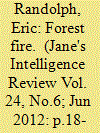

|
|
|
| 6 |
ID:
130730
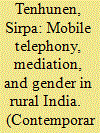

|
|
|
|
|
| Publication |
2014.
|
| Summary/Abstract |
This article aims to develop the understanding of new media and social change by examining how mobile phones mediate kinship and gender in rural India. I provide a nuanced picture of the contested nature of kinship and gender in the village based on long-term fieldwork in order to explore how mobile phones mediate relationships and ongoing processes of social change. The article illustrates how the physical qualities of phones help strengthen the multiplicity of discourses by mediating relationships and contributing to the multiplicity of speech contexts. Mobile phone use has been encouraged and motivated by kinship relationships and the use of mobile phones has, in turn, transformed these relationships by helping to create new contexts for speech and action. However, instead of the drastic improvements or changes, for instance in economic power relationships, the positive impacts of women's phone use appear subtle and ambiguous: most calls are about the slight redefinition of the home boundaries.
|
|
|
|
|
|
|
|
|
|
|
|
|
|
|
|
| 7 |
ID:
192734
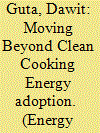

|
|
|
|
|
| Summary/Abstract |
Household solid fuel use has adverse impacts on health and the environment. The Indian government's Pradhan Mantri Ujjwala Yojana (PMUY) subsidy promoted the adoption of Liquid Petroleum Gas (LPG) by millions of Indian households. There is little knowledge, however, regarding decision-making to reduce solid fuel use after adopting cleaner fuels. Leveraging panel data on household energy use in rural India we jointly estimated LPG adoption and consumption to study the reduction in solid fuel use. Our results indicate that exclusive LPG use increased from 4.5% to 17.8% between 2015 and 2018 while fuel stacking (use of multiple fuels) doubled from 18% to 39%. The household's wealth index, self-reported higher social strata, business ownership, head of household's educational level, and the proportion of LPG-using households in the village were positively associated with LPG consumption and suspension of solid fuels. Distance to LPG refill delivery, household size and PMUY subsidy were negatively associated with LPG share though LPG share was positively associated with the interaction of PMUY with wealth index. Policy efforts should target sustained LPG consumption by making refill delivery more accessible and implementing a pro-poor refill subsidy as well as general poverty alleviation (e.g., by creating income generation opportunities).
|
|
|
|
|
|
|
|
|
|
|
|
|
|
|
|
| 8 |
ID:
158576


|
|
|
|
|
| Summary/Abstract |
Who makes claims on the state for social welfare, and how and why do they do so? This article examines these dynamics in the rural Indian context, observing that citizens living in the same local communities differ dramatically in their approaches to the state. The author develops a theory to explain these varied patterns of action and inaction, arguing that citizen claim-making is best understood as a product of exposure to people and places beyond the immediate community and locality. This social and spatial exposure builds citizens’ encounters with, knowledge of, and linkages to the state. This in turn develops their aspirations toward the state and their capabilities for state-targeted action. The author tests the theory in rural Rajasthan, drawing on a combination of original survey data and qualitative interviews. She finds that those who traverse boundaries of caste, neighborhood, and village are more likely to make claims on the state, and that they do so through broader repertoires of action than those who are more constrained by the same boundaries. The article concludes by considering the extensions and limitations of the theory and the role of the state itself in establishing the terrain for citizen action.
|
|
|
|
|
|
|
|
|
|
|
|
|
|
|
|
| 9 |
ID:
168507
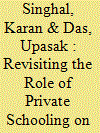

|
|
|
|
|
| Summary/Abstract |
In the view of increasing preference of private schooling in India, this article assesses its impact on learning outcomes for rural children from 8 to 11 years. Despite earlier attempts to study the issue, this article stands out in two ways. Firstly, it addresses the problems arising because of non-random selection of children attending private schools. Secondly, it also presents an all-India estimate unlike most studies which have dealt largely with few states. Our results show the performance of children attending private school to be significantly better than those from public schools. This difference is evident among ‘low-fee’ private schools as well. However the private schooling premium differ across regions and groups, and there are several other concerns regarding affordability, access and segregation which require further deliberation and debate.
|
|
|
|
|
|
|
|
|
|
|
|
|
|
|
|
|
|
|
|
|